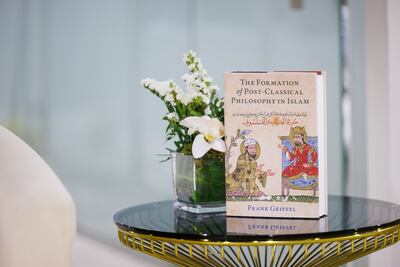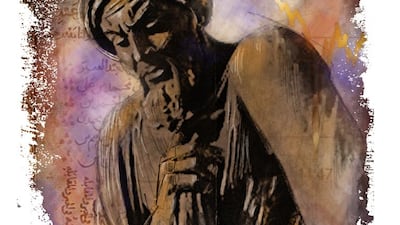Islamic philosophy is often viewed through the lens of its golden age, a heady period from the 8th to the 11th century full of advancements across the sciences and education.
It was spurred by the establishment of the House of Wisdom (Bayt Al Hikma) in Baghdad under the Abbasid Caliphate. At the time, it was one of the world's largest public libraries and home to a mammoth collection of rare Arabic research and manuscripts.
It was also a period when 10th-century Iraqi philosopher Hassan Ibn Al Haytham laid the foundations for the scientific study of optics and 8th-century Persian polymath Muhammad Al Khwarizmi reconfigured the world's understanding of mathematics by creating the calculating systems of algebra and algorithms.
scholar
Philosopher and physician Ibn Sina also published The Canon of Medicine in the 10th century, which was studied in universities across medieval Europe.
What happens after that period is not really known or understood, according to a superlative study by Frank Griffel, a German scholar and professor of Islamic Studies at Yale University in the US.
Released in 2021, The Formation of Post-Classical Philosophy in Islam sheds light on the state of Islamic intellectual discourse during the 12th century, a period Griffel feels was neglected by previous generations of scholars.
The English work was awarded the 2024 Sheikh Zayed Book Award for Arab Culture in Other Languages on Monday as part of the Abu Dhabi International Book Fair.
“A reason why there is little known about that period really goes back to this idea, which was shaped by western research in the 19th century, that philosophy in the Islamic world ended in the 12th century,” Griffel tells The National. “But now we agree that it is mostly a colonial discourse serving the purpose of western Europeans more than really describing the situation in the Islamic world.”

Griffel argues that Islamic philosophy, instead, has taken a different course in this “post-classical” phase in its embrace of influences from outside the Muslim world.
Arabic translations of works from Greek, Syriac and Persian philosophers flourished during that period as well as the integration of Greek philosophy, particularly by Plato and Aristotle, into works by Islamic thinkers. As a result, a new body of rational philosophical texts were produced by Muslim intellectuals.
These works used Aristotelian principles of thought and logic in their interrogations of existential and metaphysical concepts such as the workings of the universe and nature of the soul.
Griffel’s books cite seminal philosophical works by Persian polymath Fakhr Al Din Al Razi and Iraqi physicist Abu Al Barakat Al Baghdadi as examples of that evolution.
Acknowledging these developments matter, Griffel notes, as it counters false narratives that Islamic intellectual thought declined at the onset of the 13th century and had to be replaced by its western counterpart.
The Formation of Post-Classical Philosophy in Islam lays down the case in exhaustive study beginning from an exploration of how Khorasan (in modern day Iran) was the intellectual birthplace of post-Islamic classical philosophy to highlight some of the key works and figures during the century.

Griffel notes how Al Razi and Al Baghdadi were at ease writing philosophical and spiritual texts without any perceived internal crisis of conscience. “And that's because there was no real concept of secularism in those days. You can be an Islamic personality who at one point thinks as a theologian and at another as a philosopher. But really what they were doing was basically the same thing in that they are providing an explanation in a specific way,” he says.
“Al Razi is very interesting in that he is largely known in the Muslim world as a theologian and his 32-volume commentary on the Quran (Tafsir Al Razi), but what they really don’t know is that he is an author of a great number of straightforward philosophical books that are independent of any revelation.
“In these books he just looks at philosophy in a very Aristotelian way and builds his argument with a premise, conclusion and ultimately comes out with certain new teachings.”
Nearly a decade in the making, Griffel's thesis mostly used source material from the Suleymaniye Library in Istanbul. “It is the most important library for those in my field and has tens of thousands of manuscripts,” he says. “Because many of these rich texts were not edited or printed I would often go there to collect them or spend time on a computer portal and basically click through them.”
An Arabic translation of The Formation of Post-Classical Philosophy in Islam will be released later in the year. Griffel hopes to show certain sections of the Muslim world how Islamic philosophy remains relevant today.
“I find that there can be some prejudice existing against non-Muslim authors writing something sensible about Islamic scholars,” he says.
“But these books and a prize like the Sheikh Zayed Book Award, for example, shows these great thinkers are not just important to Islam, but to the history of philosophy period.”


